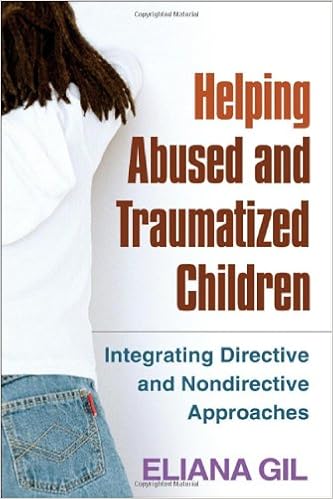
Helping Abused And Traumatized Children: Integrating Directive And Nondirective Approaches Download Free (EPUB, PDF)

Presenting an integrative model for treating traumatized children, this book combines play, art, and other expressive therapies with ideas and strategies drawn from cognitive-behavioral and family therapy. Eliana Gil demonstrates how to tailor treatment to the needs of each child by using both directive and nondirective approaches. Throughout, practical clinical examples illustrate ways to target trauma-related symptomatology while also helping children process painful feelings and memories that are difficult to verbalize. The book concludes with four in-depth cases that bring to life the unique situation of each child and family, the decision-making process of the therapist, and the applications of developmentally informed, creative, and flexible interventions.

Paperback: 254 pages
Publisher: The Guilford Press; 1 edition (March 11, 2011)
Language: English
ISBN-10: 1609184742
ISBN-13: 978-1609184742
Product Dimensions: 6 x 0.7 x 9 inches
Shipping Weight: 11.4 ounces (View shipping rates and policies)
Average Customer Review: 4.8 out of 5 stars See all reviews (18 customer reviews)
Best Sellers Rank: #46,590 in Books (See Top 100 in Books) #17 in Books > Health, Fitness & Dieting > Psychology & Counseling > Psychiatry > Child #57 in Books > Textbooks > Medicine & Health Sciences > Medicine > Clinical > Pediatrics #89 in Books > Medical Books > Medicine > Internal Medicine > Pediatrics

WHAT COUNSELORS WILL LEARN FROM THIS BOOK(1) In play therapy, children can identify with objects or symbols, project their thoughts and feelings onto those symbols or objects, and then process difficult, painful, or conflictual material in a protected and safe way that respects defensive mechanisms and pacing.(2) How to conduct an extended developmental assessment which allows clinicians to evaluate a child's overall functioning, identify symptomatic behaviors, assess the impact of trauma, and assess the child's phenomenological experience of the abuse, including the perceptions of parental support and guidance. From this assessment, a clinician can then determine therapy plans with specific, measurable goals.(3) Clinician tools: Play Genogram; Family Genogram; a Sand World; the Child Behavior Checklist (CBCL); the Child Sexual Behavior Inventory (CSBI); the Trauma Symptom Checklist for Children; a video describing three kinds of touching: safe, hurtful, and the touching of private parts; the House-Tree-Person drawing, the Draw-a-Person, and the Kinetic Family Drawing; Family Puppet Therapy; the Talking, Feeling, Doing game; using Playmobil hospital toys.(4) How to teach children to stop unwanted thoughts, using a timer and the replacement of nice memories.(5) How to deal with four types of parental denial of sexual abuse: denial of facts; denial of awareness; denial of responsibility; and denial of impact. How to educate parents about the nature of abusers who are seductive, initiate sex, and threaten the child into silence.(6) How the clinician's greatest priority is the safety of the child.(7) How the parents of abused children often have their own painful histories of childhood abuse.
Helping Abused and Traumatized Children: Integrating Directive and Nondirective Approaches The Traumatized Brain: A Family Guide to Understanding Mood, Memory, and Behavior after Brain Injury (A Johns Hopkins Press Health Book) The Shinar Directive: Preparing the Way for the Son of Perdition's Return The Healing Power of Play: Working with Abused Children Approaches to Teaching the Works of Italo Calvino (Approaches to Teaching World Literature) Strategies, Techniques, & Approaches to Critical Thinking: A Clinical Reasoning Workbook for Nurses, 5e (Strategies, Techniques, & Approaches to Thinking) Buzzed: The Straight Facts About the Most Used and Abused Drugs from Alcohol to Ecstasy (Fully Revised and Updated Fourth Edition) The Nice Girl Syndrome: Stop Being Manipulated and Abused -- and Start Standing Up for Yourself The Computer and the Brain: Abused City (The Silliman Memorial Lectures Series) Putting Children First: Proven Parenting Strategies for Helping Children Thrive Through Divorce Integrating Children's Literature through the Common Core State Standards Children's German book: Where are the Easter Eggs. Wo sind die Ostereier: (Bilingual Edition) English German Picture book for children. Children's book ... books for children: 10) (German Edition) German children's book: My Daddy is the Best. Mein Papa ist der Beste: German books for children.(Bilingual Edition) English German children's picture ... for children:) (Volume 7) (German Edition) The Autism Discussion Page on anxiety, behavior, school, and parenting strategies: A toolbox for helping children with autism feel safe, accepted, and competent Number Talks: Helping Children Build Mental Math and Computation Strategies, Grades K 5, Updated with Common Core Connections Helping Children Succeed: What Works and Why The ADHD Workbook for Kids: Helping Children Gain Self-Confidence, Social Skills, and Self-Control (Instant Help) Late, Lost, and Unprepared: A Parents' Guide to Helping Children with Executive Functioning Beyond Consequences, Logic, and Control: A Love-Based Approach to Helping Attachment-Challenged Children With Severe Behaviors The Autism Discussion Page on the core challenges of autism: A toolbox for helping children with autism feel safe, accepted, and competent



